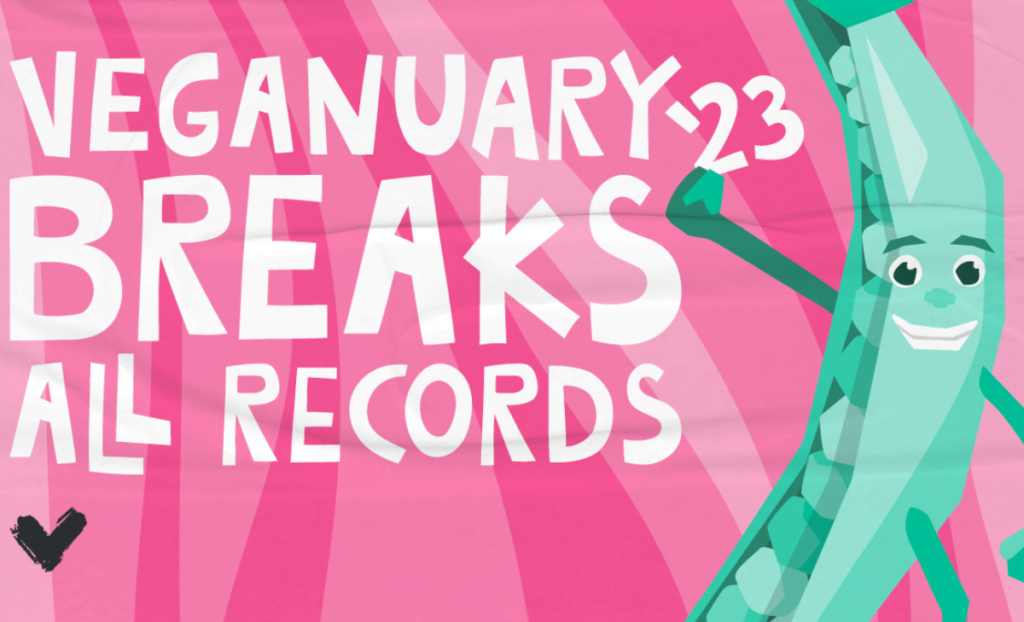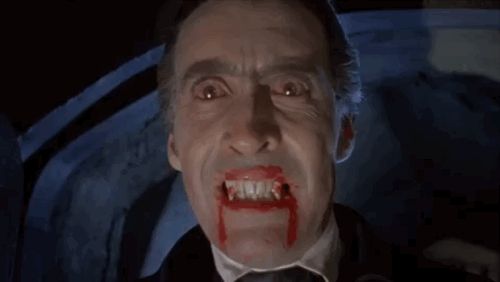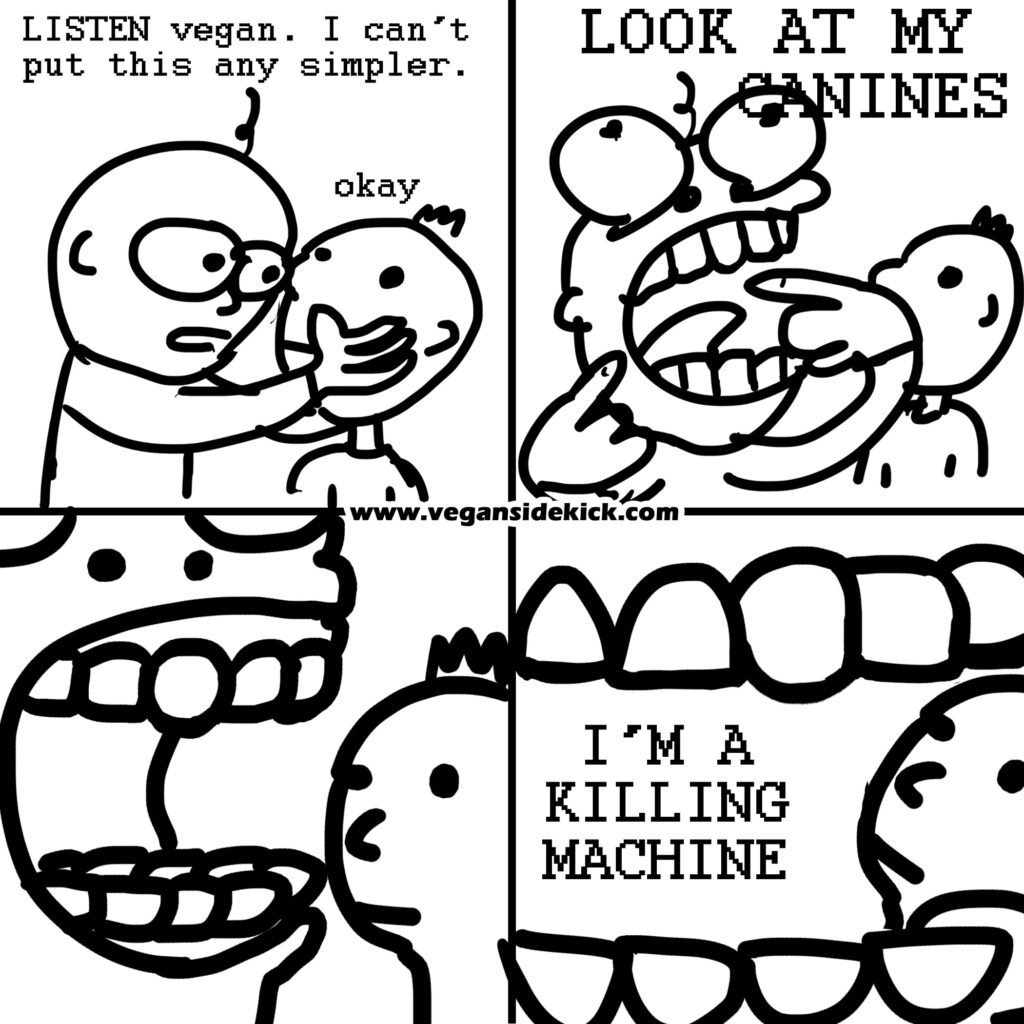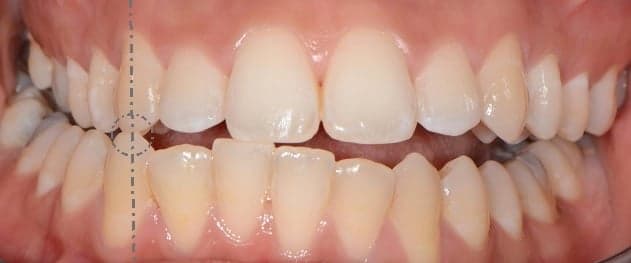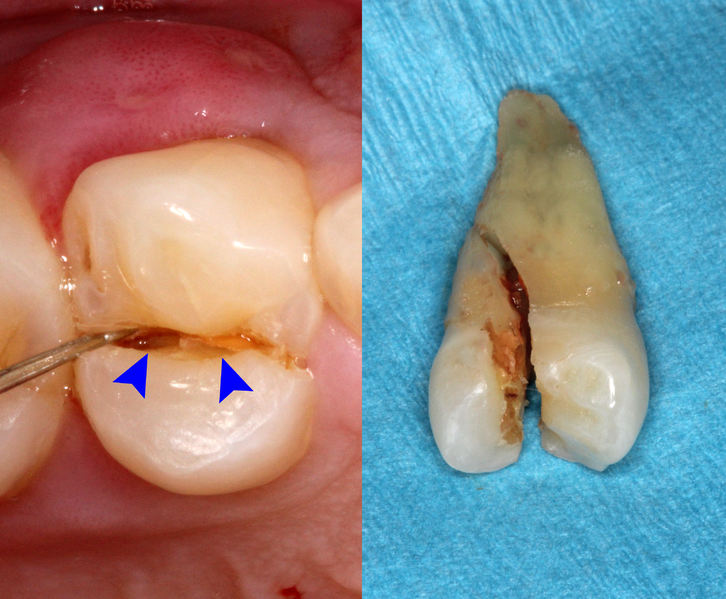
This article is written for dentists and other dental professionals – to help the dental team care for their vegan patients.
Veganism is growing. As dental professionals, we see such a wide variety of patients, that I can almost guarantee that you already have vegan patients. Probably quite a few.
The good news is that its really easy to identify your vegan patients and meet their oral care needs.
- Why is veganism growing?
- What is veganism?
- GDC Standards and Veganism
- Identifying vegan patients
- Tailored advice for vegan patients
- Easy vegan swaps
- Possible exemptions
- Vegan staff
Why is veganism growing?
The world is slowly opening its eyes to carnism – the dominant belief system and ideology that it’s okay to exploit, hurt, kill and eat certain animals. Information is now widely available about the negative impact of carnism on the climate, personal health, and biodiversity, and it’s becoming increasingly difficult to stay unaware of the inherent cruelty of animal exploitation and agriculture.
Carnism and the climate crisis
When methane and nitrous oxide are assessed along with carbon dioxide, the amount of greenhouse gas emissions produced by the global lifecycle (including producing the fertiliser and animal feed, processing and transportation etc) of land-animal agriculture is comparable to and likely greater than the direct emissions produced by all transport combined (road, rail, air & sea). It is now accepted, that a drastic reduction in meat consumption and production is absolutely vital if we wish to avoid the worst effects of climate catastrophe.
Even when climate change seems a future problem for the next generation, this generation are beginning to take control of the environmental legacy their children will inherit.
Carnism, zoonotic disease …and global pandemics
Memories are still fresh of the devastating effects of the latest pandemic originating from animals. Many people now have a new perspective on the increasing risk of more emergent zoonotic diseases, and an understanding that this increase in risk is attributed to intensifying animal agriculture.
Carnism and health
Processed meat and red meat
The WHO has categorised processed meat as a class I carcinogen and red meat as a class 2A carcinogen. It is now accepted that there is a convincing body of evidence that processed meat causes cancer and that red meat probably causes cancer.
In particular, processed meat and red meat increase the risk of developing breast, colorectal, prostate and pancreatic cancer, as well as increasing the risk for cancer mortality, cardiovascular mortality, stroke and diabetes.
Chicken
Chicken, often believed to be “a healthy meat”, raises cholesterol levels just as much as red meat, and grilled chicken has been shown to often contain carcinogenic heterocyclic amines.
Fish
Fish are a well known source of omega oils, beneficial for cardiovascular and brain health. Fish however also concentrate water pollutants such as methylmercury, polychlorinated biphenyls (PCBs) and dioxins, and they actually get their omega oils from eating algae. Research has shown that cutting out the polluted middle man (fish) and sourcing omega oils directly from plant based foods reduces the risk of coronary heart disease.
Dairy
An argument can been made that blanket recommendation of dairy consumption to the whole population is a form of systemic racism.
Lactose malabsorption is normal in humans.
Its estimated that 68% of people globally lose their ability to absorb lactose after weaning, and so when exposed to dairy, can experience gastrointestinal symptoms such as diarrhoea, flatulence, nausea, gut distension, and abdominal pain, as well as more systemic symptoms such as headache.
Lactose malabsorption affects around 1 in 10 people in the UK, but is much more prevalent in people originating from Africa, Asia, South America and even other European countries. The NHS Eatwell Guide still advises to “have some dairy” despite our knowledge that this will have adverse health outcomes for many people.
Milk and other dairy products are a top source of saturated fat which is a known a risk factor for Alzheimer’s disease and Dementia. Studies have also linked the serum insulin-like growth factor 1 and the oestrogen and progesterone in dairy products to an increased risk of breast, ovarian, and prostate cancer. Perhaps most surprisingly, and contrary to popular belief, consumption of dairy products does not necessarily make strong bones for all groups of patients.
Eggs
High egg consumption has been linked (in the studies not funded by the egg industry) to heart disease and diabetes. While a causal link has not been established, some studies have found an association of egg consumption with colon, rectal and prostate cancers, and associated with higher all-cause, cardiovascular and cancer mortality.
Carnism, land use and biodiversity
Having a diet which includes animal products in the UK requires four times as much land compared with a plant based diet. This is due to the fact animals need pasture land to live on, require additional land to grow their food, and they waste energy when converting plants to meat, dairy and eggs. Models estimate that as little as ~25% of current farmland could be enough to feed humans directly (with a plant based diet), and the remaining 75% of farmland could be rewilded.
Inherent cruelty of carnism uncovered
The message that “humane milk is a myth“, investigated and upheld by the Advertising Standards Authority, is increasingly supported by a growing and overwhelming body of evidence proving that livestock farmers and abattoirs routinely flout so called “animal welfare” standards. This well reported routine flouting of standards, along with the realisation that our standards fall very short of expectation in the first place, are leading to a growing uncomfortable feeling – when ordinary people who are against animal cruelty realise that their actions are contrary to their beliefs – known as cognitive dissonance.
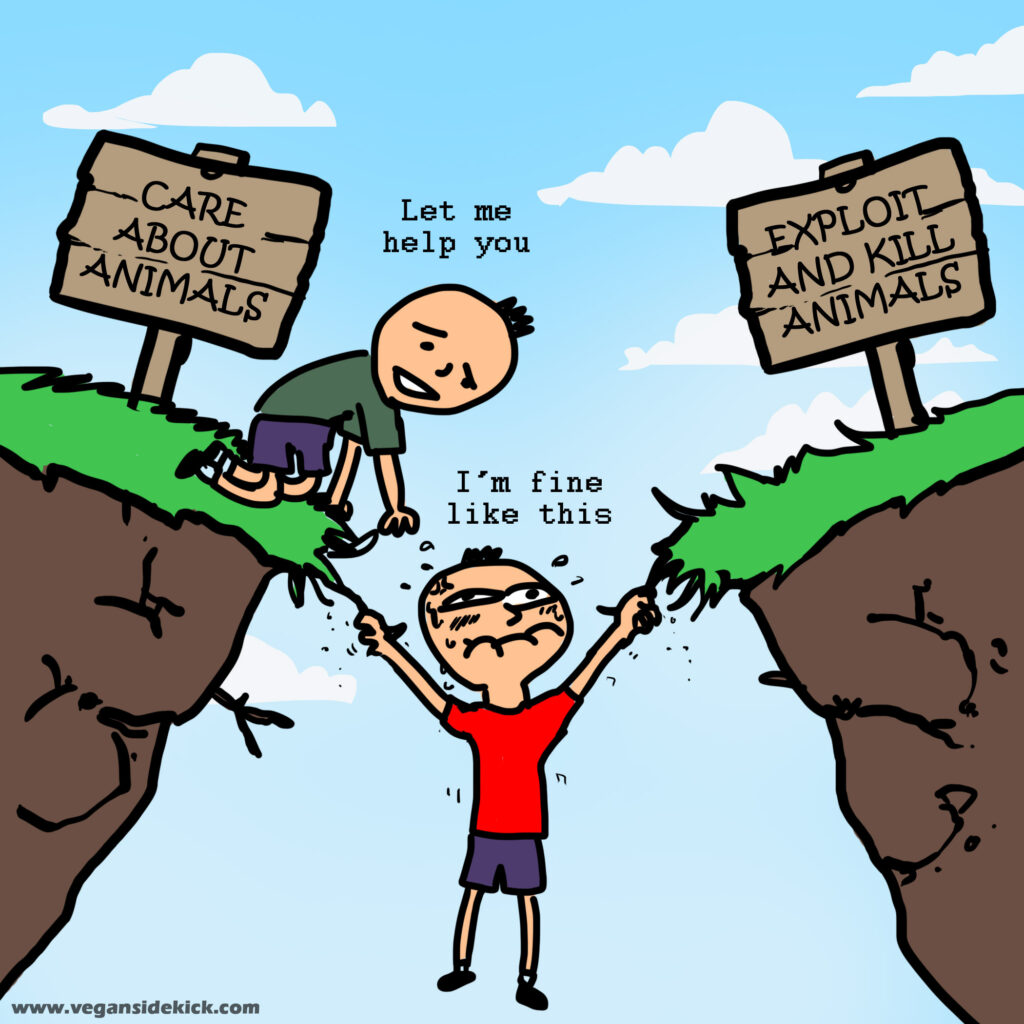
Patients are making changes
It’s not clear if it’s the repeated calls from the UN’s Intergovernmental Panel on Climate Change, the success of Extinction Rebellion‘s disruptive protests, Gretha Thumberg‘s frank speeches to world leaders, Sir David Attenborough’s beautifully emotive documentaries, or easy access to eye-opening and persuasive documentaries (such as The Game Changers, What The Health and Forks Over Knives) …but our patients are listening.
It is estimated around 7.2 million adults in the UK (14%) already do not eat meat, and of them, 1.4 million follow a vegan lifestyle.
Veganuary is becoming more popular each year, offering not just the much needed benefits to the environment, but the fantastic benefits to personal health, more food freed up to help feed the world’s starving and malnourished, and mercy for animals. Its campaign which encourages and supports people to adopt a plant based diet for the month of January, managed to entice over 700,000 people to try being vegan in 2023.
Our governments are starting to listen
In 2019 Canada completely removed dairy from its visual food guide. The NHS Eat Well Guide now advises to “eat less red and processed meat like bacon, ham and sausages”.
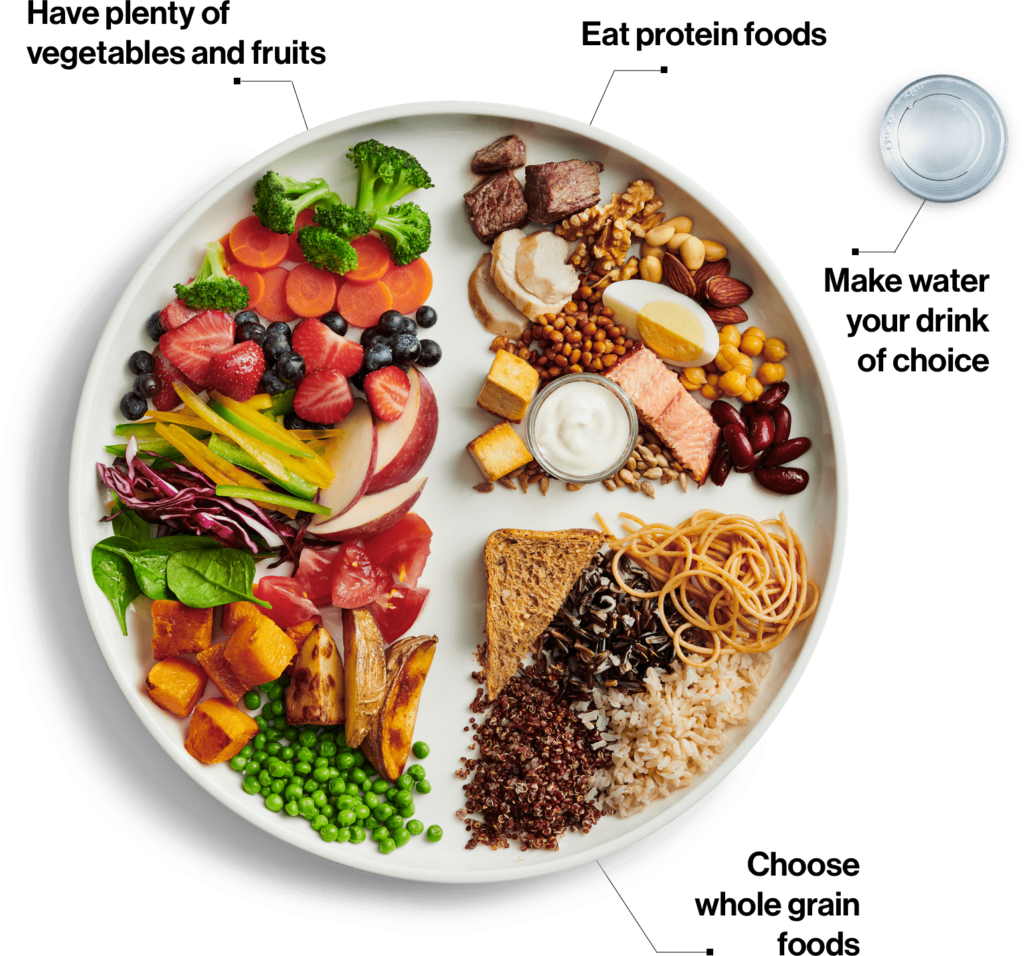
What is veganism?
Veganism offers an alternative to carnism. In short, veganism is simply the avoidance of animal cruelty and exploitation.
The authoritative definition from the Vegan Society is more comprehensive:
…a philosophy and way of living which seeks to exclude – as far as is possible and practicable – all forms of exploitation of, and cruelty to, animals for food, clothing or any other purpose; and by extension, promotes the development and use of animal-free alternatives for the benefit of animals, humans and the environment. In dietary terms it denotes the practice of dispensing with all products derived wholly or partly from animals.”
The Vegan Society

Vegan or plant-based?
‘Plant-based’ and ‘vegan’ are often used interchangeably but this is incorrect. Plant-based is a term usually used to describe a diet, food or list of ingredients wholly derived from plants, whereas veganism describes a lifestyle and ethical philosophy rather than just a diet or list of ingredients. All vegans will have a plant-based diet but not all people who choose a plant-based diet will be vegan.
Why is veganism relevant to dentistry?
Vegans choose to not consume or support anything which exploits animals, including food and drink (meat, dairy, eggs, honey), clothes (fur, leather, feathers), toiletries, medicines, and cleaning products (often tested on animals and use animal ingredients).
Of relevance to dentistry, beyond the obvious difference in diet, our vegan patients’ choices of toothpaste, mouthwash, medicines, and dental treatment options may be different too.
Importantly, “as far as is possible and practicable” (from the definition of veganism) means an exemptions can be made if there is no alternative available and something is necessary, especially for healthcare, including dentistry.
That being said, there are some “possible and practicable” easy vegan swaps in dentistry.
GDC Standards and Veganism
While the GDC Standards do not mention veganism explicitly, several of the standards certainly do apply:
Listen, dignity and respect
Standard 1.1: You must listen to your patients
1.1.1 You must discuss treatment options with patients and listen carefully to what they say. Give them the opportunity to have a discussion and to ask questions.
Standard 1.2: You must treat every patient with dignity and respect at all times
1.2.2 You should take patients’ preferences into account and be sensitive to their individual needs and values.
In order for you to be sensitive to your vegan patients’ values, it might be useful to ask about ethical beliefs when taking a social history:
“Do you have any ethical or religious beliefs that may affect your dental care?”
Valid consent, honesty and integrity
Standard 3.1: You must obtain valid consent before starting treatment, explaining all the relevant options and the possible costs.
3.1.3 You should find out what your patients want to know as well as what you think they need to know.
It’s safe to assume our vegan patients will want to know if a treatment option is considered non-vegan, since this information could result in refusal of consent. It can be hard to find out if the dental materials you use have any animal derived ingredients or whether they have been tested on animals. This information is however sometimes included on product information sheets, and there are several important cases to note below (in the easy vegan swaps section).
Standard 1.3: You must be honest and act with integrity
1.3.1 You must justify the trust that patients, the public and your colleagues place in you by always acting honestly and fairly in your dealings with them.
When discussing treatment options with your vegan patients, its important to disclose when you are aware that a treatment option might be considered not suitable for vegans. It then follows that you would explain any alternative treatment options, as well as the risks associated with ‘no treatment’ if the patient declined consent.
Holistic preventative approach
Standard 1.4: You must take a holistic and preventative approach to patient care which is appropriate to the individual patient
1.4.1 A holistic approach means you must take account of patients’ overall health, their psychological and social needs, their long term oral health needs and their desired outcomes.
1.4.2 You must provide patients with treatment that is in their best interests, providing appropriate oral health advice and following clinical guidelines relevant to their situation. You may need to balance their oral health needs with their desired outcomes. If their desired outcome is not achievable or is not in the best interests of their oral health, you must explain the risks, benefits and likely outcomes to help them to make a decision.
Providing oral health advice relevant to your vegan patients’ situations means providing tailored diet advice, resisting any urges to suggest dairy or other animal products, and instead explaining alternative plant based sources of relevant nutrients (see the tailored advice for vegan patients section below).
A “holistic and preventative approach …appropriate to the individual patient” “taking into account the patients overall health” could also be interpreted to suggest that we should consider, when relevant, sharing our knowledge to help educate non-vegan patients about the known risks of dairy and meat consumption to their overall health. Rather than blindly (or lazily) recommending only dairy for calcium and meat for iron, perhaps we should routinely give more tailored advice including the healthier plant-based alternatives.
Do not cause distress
Standard 1.6: You must treat patients fairly, as individuals and without discrimination
1.6.1 You must not discriminate against patients on the grounds of: Age, Disability, Gender reassignment, Marriage and civil partnership, Pregnancy and maternity, Race, Religion or belief, Sex, Sexual orientation. You must also ensure that you do not discriminate against patients or groups of patients for any other reasons such as nationality, special needs, health, lifestyle or any other consideration.
1.6.4 You must not express your personal beliefs (including political, religious or moral beliefs) to patients in any way that exploits their vulnerability or could cause them distress.
It goes without saying that you should not discriminate against any group of patients based on their beliefs or lifestyle, but its worth noting that veganism is now considered a protected characteristic under the Equality Act 2010 and so this now both an ethical and a legal obligation.
For vegan patients, you should also be careful not to express any personal carnist beliefs in a way that might cause cause distress. This means simply avoiding offensive tropes and jokes in the same way you avoid making racist or anti-religious comments.
How to identify vegan patients
The easiest way to identify your vegan patients is include a question on your medical history form:
“Do you have any ethical or religious beliefs that may affect your dental care?“
This would also help to identify Jehovah’s Witnesses, muslims, hindus, jews, and vegetarians.
Tailored advice for vegan patients
Questions I always ask my patients when they disclose they are vegan:
Which toothpaste do you use?
In my experience there seems to be a significant crossover in the healthy living, zero waste, vegan, and conspiracy advocate markets. I get the impression that most health orientated shops try to cater for all these categories at once, and in doing so often seem to jump on the anti-fluoride bandwagon. Vegans get drawn in by their vegan offerings and labelling, and can be lead into thinking fluoride-free toothpaste is somehow particularly vegan. Sometimes they just haven’t noticed the vegan toothpaste they have been using is fluoride free. Hence I always ask which toothpaste they are using, Google the brand if I don’t know it, and recommend 1450ppm …or depending on the bitewings, maybe prescribe 5000ppm!
Do you know where you are getting your B12 from?
Vegans need to consciously ensure their diet includes vitamin B12 – unlike carnists who take B12 supplements unconsciously/indirectly (B12 supplements are instead administered to the animals they eat). The easiest way to ensure an adequate B12 intake for most vegans will be to take a B12 supplement – either daily or weekly. Some vegan foods contain B12 (such as Marmite, nutritional yeast, vegan milk and cereals), so some vegans may instead monitor their dietary intake and might not require regular B12 supplements.
Do you know where you are getting your iron from?
Adequate iron is easy to get from a varied plant-based diet, but a legitimate vegan diet might be exclusively eating dark chocolate and vegan Ben & Jerry’s ice cream. It’s therefore important that vegans understand where their iron is coming from.
Plant-based sources of iron include:
- Dark green leafy vegetables – spinach, kale, watercress, broccoli
- Sweet potatoes
- Peas
- Tofu
- Dried fruit – raisins, dates, figs, prunes and apricots
- Chickpeas
- Molasses
- Beans
- Artichokes
- Quinoa
- Lentils
- Pumpkin and pumpkin seeds
- Fortified cereals
- Dark chocolate
Have you planned where your children are getting their calcium from?
Calcium is really easy to get from a varied plant-based diet. Cows’ milk is a lazy suggestion which carries health risks, so reassure parents that a balanced vegan diet is healthy for all age groups, but they must be mindful to include sources of calcium especially in younger vegans.
Plant-based sources of calcium include:
- Bread and anything made with fortified flour
- Fortified plant milks and yogurts
- Tahini
- Tofu
- Beans – black turtle beans, kidney beans, soya beans
- Leafy green vegetables – broccoli, watercress, mustard greens, pak choi, broccoli, chard (but not spinach)
- Green vegetables – cabbage, kale, okra
- Sweet potatoes
- Butternut squash
- Nuts – almonds, brazil nuts, hazelnuts, pistachio nuts, walnuts
- Seeds – chia, poppy, sesame
- Dried fruit – figs, apricots, currants
Easy vegan swaps
The items below are not vegan and should not be considered exempt, since they can easily be swapped out for alternatives with no animal derivatives. If you recommend or provide any of the items below to a vegan patient but have not made them aware that these items contain an animal derivative or that a vegan alternative option was available, it could be questioned whether you have obtained valid consent for treatment. Therefore all dental care professionals providing these items should be aware that they are not suitable for vegans and routinely offer alternatives to their vegan patients.
- Amoxicillin capsules – contain gelatine. Easy swap: amoxicillin oral suspension (sugar free).
- Duraphat 22,600ppm fluoride varnish – contains beeswax and shellac. Easy swap: Profluorid varnish.
- Ibuprofen tablets (generic) – contain lactose. Easy swap: Nurofen.
- Milk and dairy for calcium. Easy swap: a rich and varied plant based diet.
- Toothpaste – assume tested on animals unless otherwise indicated, may contain animal derived glycerin. Easy swap: vegan toothpaste.
- Tooth Mousse – contains casein (dairy). Easy swap: vegan sensitive toothpaste or alternative treatment (eg fluoride varnish, adhesive restoration, fluoride trays).
- Xenograft bone augmentation materials (e.g. Bio-Oss) – contain bovine bone. Consider swapping for an autograft or allograft, or if a satisfactory result can be obtained with a denture, bridge, orthodontic space closure or accepting a space / shortened dental arch.
If you have more suggestions please leave a comment below.
Possible exemptions
In some circumstances, the following items may be considered exempt if no alternative options are available or appropriate.
- Dental waxes (e.g. red carding wax, pink modelling wax, etc used mainly for lab work) – contain beeswax, often <1%. Although its possible to make vegan wax, I’ve not found any in the dental market yet.
- Fluoride 5000ppm and 2800ppm toothpastes – as with all medicines, high fluoride toothpastes have been tested on animals, but should be considered exempt if deemed necessary and no alternatives are available.
- Haemostatic collagen cubes (e.g. Haemosponge, Haemocollagene etc) – contain bovine collagen. Usually other local haemostatic methods can be used, e.g. applying pressure for longer, sutures, silver nitrate. Another alternative may be to call the local maxillofacial surgery or oral surgery department to find out if alternatives are currently available there and then transferring the patient while still applying pressure with gauze. If alternatives are not available, suitable or successful, then haemostatic collagens cubes might be considered exempt but this likely to cause some distress and so should be discussed and agreed with the patient.
- Medicines in capsules and some tablets (especially film coated) – capsules usually contain gelatine and/or shellac, tablets often contain lactose. Often can be swapped to different formulation – sometimes to tablet (from capsule), oral suspension or dispersible tablet. Search the Electronic Medicines Compendium and check the List of excipients. If no vegan alternative is available and the medicine is required, then an exception may be required.
If you have more suggestions please leave a comment below.
Vegan staff
Veganism is a protected characteristic under the 2010 Equality Act. This places places a legal obligation upon employers to ensure that they do everything they can to avoid discriminating against vegans in the workplace.
Vegans will easily fit into the dental team without any special adjustments being made. If you would like to be extra considerate of your vegan colleagues, there are some simple steps you take to ensure they feel valued and respected members of your team.
Your practice will already have an Equality and Diversity in the workplace policy in place. As a part of this, if you have any vegan team members, your can easily provide vegan alternatives where possible and appropriate:
- Providing vegan milk in the staffroom (if you normally provide cows milk).
- Ensuring there are vegan food and drink options at work functions and meetings e.g. staff parties, work birthday celebrations, working lunches etc.
- Consider dedicating a shelf in the kitchen fridge to be free from animal products, ideally above any shelves with meat or cheese etc to avoid drip contamination.
- Consider choosing vegan washing machine detergent and softener – if you use reusable surgical gowns or provide a scrub/uniform washing service.
- Consider choosing vegan soap and hand cream.
The good news is that vegan alternatives are now widely available, inexpensive and sometimes cheaper than non-vegan options. They are usually suitable for all non-vegans too, and they are usually halal and kosher.
You can find more suggestions and helpful guidance on Veganism in the workplace from the Vegan Society.
If you have more suggestions please leave a comment below.
This article is continually updated. If you have a suggestion or question, please leave a comment below.
